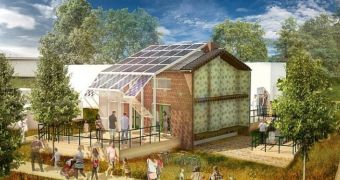A bunch of students at the Delft University of Technology in the Netherlands have come up with a rather ingenious idea to help homes become energy neutral.
Thus, these brainiacs have developed a so-called solar-powered skin which they expect will pave the way for Dutch homes to become a tad more environmentally friendly than they currently are without having to undergo any major transformations. Gizmag tells us that this innovative skin is intended to cover the exterior of a given building. Its exterior side is fitted with glass and photovoltaic panels, whereas the one on the inside is meant to provide insulation.
This basically means that, whereas the exterior side of the solar-powered skin is busy harvesting green energy, the one on the inside is hard at work making sure that heat does not go to waste.
Interestingly enough, it would appear that, when designing the solar-powered skin, the Deft University of Technology students did not forget to take adaptability into consideration.
Thus, they say that, during the winter months, the skin would completely wrap itself around a house in order to contain heat. During autumn and spring, however, it would partially open to allow for ventilation.
Whenever temperatures increase to a considerable extent, it would completely open and consequently ensure that air flow is maximized.
Reports say that, for the time being, about 60% of the people in the Netherlands live in row houses, 25% of which date back to the post-war period.
This means that sustainability and energy saving do not get as much attention as they should.
The Deft University of Technology students argue that, according to their investigations, many of the people living in these homes would not mind to somewhat improve on their ecological footprint.
The trouble is that, more often than not, they either lack the financial means or simply aren't in a good enough state of mind to invest in large renovation projects.
What's more, there are some who believe that, should such renovation projects be carried out, the neighborhood in which they live would lose what they call its historic feel.
Due to the fact that it does not require any major alterations to be done to a building in order to accommodate for it, the solar-powered skin is expected to help homes become more environmentally friendly without sacrificing their look in the process.
The students are expected to showcase their solar-powered skin at the 2014 Solar Decathlon Europe. More precisely, they will fit the skin to a model home, and let people see for themselves what it looks like and how it works.

 14 DAY TRIAL //
14 DAY TRIAL //